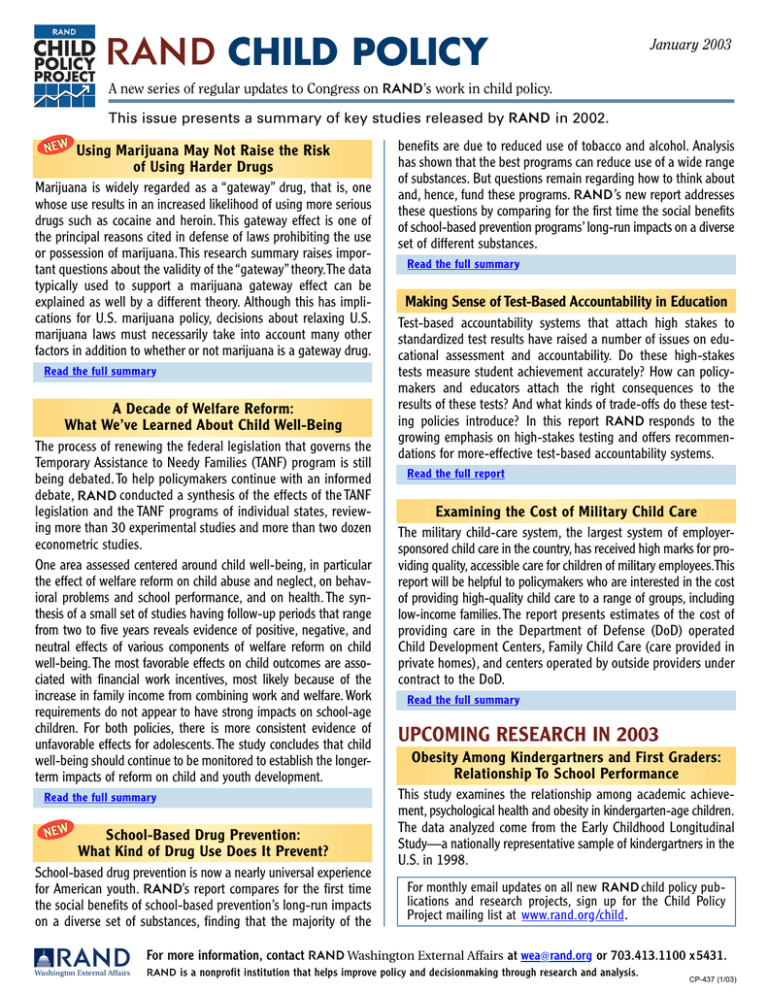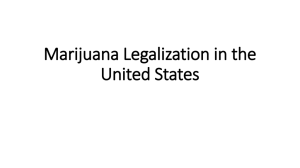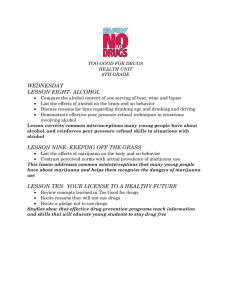R CHILD POLICY
advertisement

R CHILD POLICY January 2003 A new series of regular updates to Congress on R’s work in child policy. This issue presents a summary of key studies released by NEW Using Marijuana May Not Raise the Risk of Using Harder Drugs Marijuana is widely regarded as a “gateway” drug, that is, one whose use results in an increased likelihood of using more serious drugs such as cocaine and heroin. This gateway effect is one of the principal reasons cited in defense of laws prohibiting the use or possession of marijuana.This research summary raises important questions about the validity of the “gateway” theory.The data typically used to support a marijuana gateway effect can be explained as well by a different theory. Although this has implications for U.S. marijuana policy, decisions about relaxing U.S. marijuana laws must necessarily take into account many other factors in addition to whether or not marijuana is a gateway drug. Read the full summary A Decade of Welfare Reform: What We’ve Learned About Child Well-Being The process of renewing the federal legislation that governs the Temporary Assistance to Needy Families (TANF) program is still being debated. To help policymakers continue with an informed debate, R conducted a synthesis of the effects of the TANF legislation and the TANF programs of individual states, reviewing more than 30 experimental studies and more than two dozen econometric studies. One area assessed centered around child well-being, in particular the effect of welfare reform on child abuse and neglect, on behavioral problems and school performance, and on health. The synthesis of a small set of studies having follow-up periods that range from two to five years reveals evidence of positive, negative, and neutral effects of various components of welfare reform on child well-being.The most favorable effects on child outcomes are associated with financial work incentives, most likely because of the increase in family income from combining work and welfare. Work requirements do not appear to have strong impacts on school-age children. For both policies, there is more consistent evidence of unfavorable effects for adolescents. The study concludes that child well-being should continue to be monitored to establish the longerterm impacts of reform on child and youth development. Read the full summary NEW School-Based Drug Prevention: What Kind of Drug Use Does It Prevent? School-based drug prevention is now a nearly universal experience for American youth. R’s report compares for the first time the social benefits of school-based prevention’s long-run impacts on a diverse set of substances, finding that the majority of the R Washington External Affairs R in 2002. benefits are due to reduced use of tobacco and alcohol. Analysis has shown that the best programs can reduce use of a wide range of substances. But questions remain regarding how to think about and, hence, fund these programs. R’s new report addresses these questions by comparing for the first time the social benefits of school-based prevention programs’ long-run impacts on a diverse set of different substances. Read the full summary Making Sense of Test-Based Accountability in Education Test-based accountability systems that attach high stakes to standardized test results have raised a number of issues on educational assessment and accountability. Do these high-stakes tests measure student achievement accurately? How can policymakers and educators attach the right consequences to the results of these tests? And what kinds of trade-offs do these testing policies introduce? In this report R responds to the growing emphasis on high-stakes testing and offers recommendations for more-effective test-based accountability systems. Read the full report Examining the Cost of Military Child Care The military child-care system, the largest system of employersponsored child care in the country, has received high marks for providing quality, accessible care for children of military employees.This report will be helpful to policymakers who are interested in the cost of providing high-quality child care to a range of groups, including low-income families.The report presents estimates of the cost of providing care in the Department of Defense (DoD) operated Child Development Centers, Family Child Care (care provided in private homes), and centers operated by outside providers under contract to the DoD. Read the full summary UPCOMING RESEARCH IN 2003 Obesity Among Kindergartners and First Graders: Relationship To School Performance This study examines the relationship among academic achievement, psychological health and obesity in kindergarten-age children. The data analyzed come from the Early Childhood Longitudinal Study—a nationally representative sample of kindergartners in the U.S. in 1998. For monthly email updates on all new R child policy publications and research projects, sign up for the Child Policy Project mailing list at www.rand.org/child. For more information, contact R Washington External Affairs at wea@ rand.org or 703.413.1100 x 5431. R is a nonprofit institution that helps improve policy and decisionmaking through research and analysis. CP-437 (1/03)




![[H1]Researching Society with MicroCase Online](http://s3.studylib.net/store/data/007737973_2-9d35b9e42208c660471ccaa373bd3b78-300x300.png)